
|
if your browser doesn't support the menu, please use the links at the
bottom of the pages
|
||

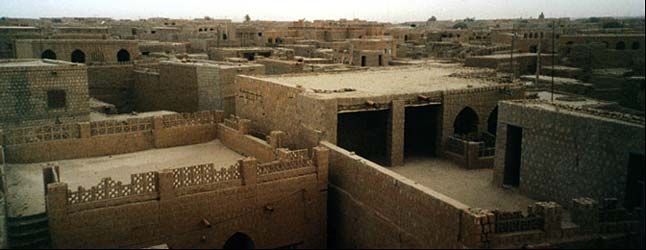 |
||
Timbuktu rooftops; photo:web |
||
| |
||
Riverboats
come from the South |
||
Salt
camels come from the North |
||
Wisdom
and Knowledge reside in Timbuktu |
||
Tamashek
proverb |
||
| |
||
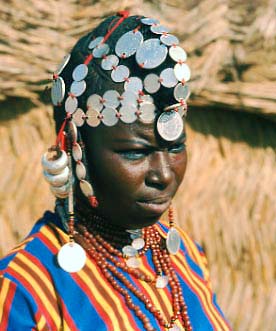 |
||
young woman of Burkina Faso; photo:
web |
||
 |
||
| Thus we arrived at Mopti, our first destination in Mali,
by truck. Mopti is located at the junction of the Niger River and the
Bani River, almost halfway between Timbuktu and Bamako, Mali's capital.
The Niger has long been a major avenue for trade across West Africa. Large
canoes, sometimes powered by outboard engines, loaded with freight and
passengers, travel from port to port along the great river. The port of
the city of Mopti was one of the great trading centers of all of Africa
in the 14th to 19th centuries and continues to be important for local
commerce. |
||
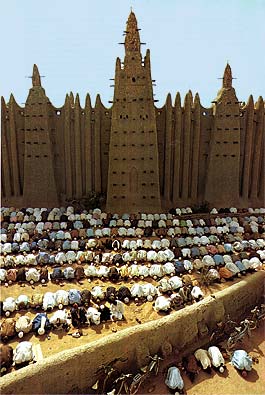 |
||
Komoguel mosque, Mopti; photo: National Geographic |
||
| What we noticed in Mopti was the significant increase of people that ostensibly weren't beggars asking money from us, the reason for this possibly was that quite a few travelers passed through the town on their way to Timbuktu. | ||
| We returned to our lodgings past nightfall, and thus had to use a flashlight to find our way. So it happened that at the campement's unlighted entrance, the beam of our flashlight passed over a man sitting on the ground. This caused the fellow to jump up and angrily reprimand us, claiming that in Mali it was prohibited to point a flashlight at people. He probably hoped we'd pay him a compensation for the committed "offence". Fat chance! | ||
| Next morning we made our way to the river port, where we purchased our boat tickets for Timbuktu. | ||
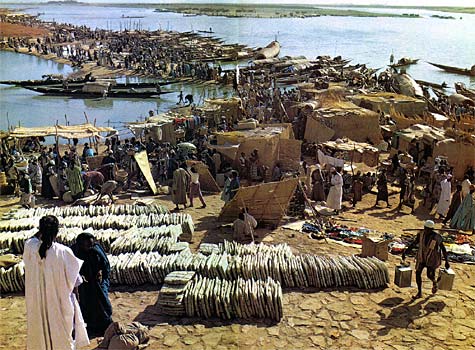 |
||
salt slabs at Mopti harbor; photo:
National Geographic |
||
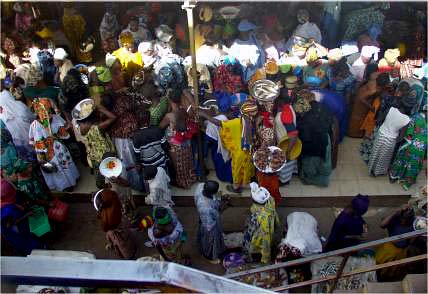 |
||
selling and buying in Mopti; photo: web |
||
| The Germans had studied Africa at Berlin University and were convinced to know all that was to know about the continent. Actually they had no idea. A talk with them soon erupted into a very emotional verbal fight, with one of them getting so upset that a spray of spittle issued from his wide open mouth. Seeing that those students were too narrow minded to understand that real life is somewhat different from academic teachings and theories, we kept to ourselves for the rest of the journey. | ||
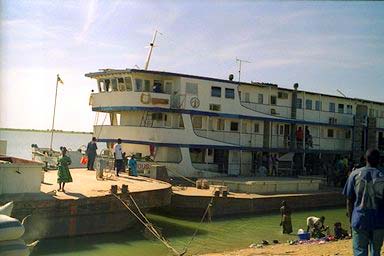 |
||
riverboat on Niger; photo: web |
||
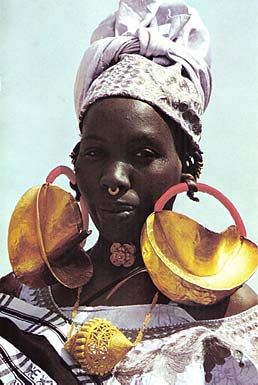 |
||
Malian beauty wearing typical gold ornaments;
photo: National Geographic |
||
| Getting off the boat, we instantly spotted a lank figure approaching. Who else could it have been but our old friend Holli, his head adorned by a turban, the bristles of his crew cut hair peeking through the cloth, trailed by a group of kids gaily shouting "Ivan" after him. With his blond and blue eyed looks, Holli could have passed for a Russian indeed. | ||
| One of the passenger vehicles waiting to transfer the ship's passengers brought us to the town proper, located some 18 km from the river Niger. | ||
| With Timbuktu we had finally reached the goal of our journey, the fabled city in the desert that since the 12th century had been a forbidden place and one of the most august centers of Islamic learning and trade within Muslim society. Yet since the late 1800s, the city's importance had declined, drifting to the sandy edges of the Sahara desert and into the imaginations of the New World's folklore. | ||
| Back when Timbuktu was one of the centers of the the Islamic world, scholars and students traveled from as far away as Cairo, Baghdad, and Persia to study from the noted manuscripts found in Timbuktu's great library. Respected scholars who taught in Timbuktu were referred to as ambassadors of peace throughout North Africa. | ||
| Traveling across the windswept sand dunes, caravans often numbering more than hundred have journeyed to the salt mines of Taudenni, 500 miles north of Timbuktu. A human necessity and source of commerce, salt has been in high demand in West Africa since the 12th century when it was first found in the sand dunes of the desert. Its discovery gave rise to a robust commodity trade that quickly paved a near-mythical trail connecting Timbuktu with Europe, southern Africa, and Persia. With the trade of Taudenni's prized salt, came the ability to move people, information, and ideas across the Sahara desert. | ||
| To this day, camel caravans laden with salt, also known as "the
gold of the desert," journey to Timbuktu, from where the salt is
brought to the markets of the river towns of Mopti, Djénné,
and beyond. |
||
| By the 1300s the "Ambassadors of Peace" centered around the
University of Timbuktu created roving scholastic campuses and religious
schools of learning that traveled between the cities of Timbuktu, Gao,
and Djénné, helping to serve as a model of peaceful governance
throughout an often conflict-riddled tribal region. |
||
| At its peak, over 25,000 students attended the University of Timbuktu. With the Moroccan invasions from the north at the beginning of the 1600s, however, the scholars of Timbuktu began to slowly drift away and study elsewhere. As a result, the city's sacred manuscripts began to fall into disrepair. While Islamic teachings there continued for another 300 years, the biggest decline in scholastic study occurred with the French colonization of present-day Mali in the late 1890s. | ||
| Thousands of the sacred manuscripts lie in private collections that date back over some 600 years. The largest collection can be found at the Ahmed Baba Research Center. Some scholars estimate that there are over 700,000 manuscripts housed throughout collections in Timbuktu. | ||
 |
||
one of Timbuktu's libraries housing old manuscripts;
photo: web |
||
| With the pressures of poverty, a series of droughts, and a tribal Tuareg rebellion in Mali that lasted over ten years, the manuscripts continue to disappear into the black market, where they are illegally sold to private and university collections in Europe and the United States. | ||
| Today Timbuktu is designated as World Heritage Site by the UNESCO. Through the efforts of the Timbuktu Heritage Institute, the manuscripts of Timbuktu are beginning to be re-catalogued, preserved, and protected against theft. | ||
 |
||
| On several buildings in Timbuktu, plaques tell of the famous explorers who had once lodged there, most noteworthy among them the French adventurer René Caillié. If he wasn't the first European to visit legendary Timbuktu in 1828, at least he was the first who came back alive. All the predecessors of Caillié have been killed or died of disease, hunger or thirst. Over centuries the name Timbuktu aroused the avarice and curiosity of the Europeans, because the entrance to this sacred city of the Islam was forbidden for nonbelievers. | ||
 |
||
mansion once inhabited by one of the early explorers;
photo: web |
||
| Compared to today, any touristic infrastructure was practically non-existent back in the early seventies though. Neither did we encounter hustlers offering us their services nor shops catering to souvenir hunters. The only "hotel" in town to my knowledge was the very basic campement, where tourists could spend the night, to leave again next day. Its restaurant was probably theonly place offering tourist food. Tours in the vicinity were difficult to arrange | ||
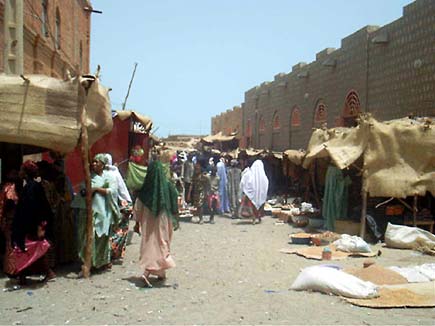 |
||
Timbuktu market street; photo: web |
||
|
||
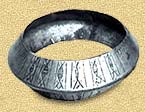 |
||
| After perusing the problem for a while, a possible solution came to my mind. Worried the woman might leave, I hurried back to our room, to rummage through bags and bundles for a silver head ornament from Sri Lanka, embellished with glittering glass stones, of the type worn by Indian brides or dancers. Back at the market, with gestures I offered to the woman to exchange her bangles for that piece of foreign jewelry that, due to its exclusivity so far from its origins, was sure to become the very envy of her neighbors and friends. She was only too happy to comply. Equally satisfied, I forced the bangles over my hands, not to take them off anymore until about a year later in Egypt, where I was to get a pair of heavy silver ones. | ||
| The second important purchase I made in Timbuktu was a neck purse of fine leather, of the type the Tuareg wear under their robes, to keep their money safe. The slim rectangular pouch had several compartments and a casing that could be slid up or down on the neck string to open or close. With its leather tassels and the carefully carved and painted geometric patterns on each of the compartments and the casing, it looked really neat; a genuine article of daily use. Of excellent quality, the purse was to serve its purpose for many years to come, until the day a thief ripped it right off my neck in India. Even then, despite having it worn every single day since I had bought it, its leather string still was strong enough to leave deep marks in the skin of my neck before it broke. | ||
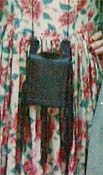 |
||
my Tuareg purse |
||
| Rice or pasta with a watery sauce made of dried onions and tomatoes was our main fare. Both the rice and the pasta, as everything else in Timbuktu, was full of sand, which caused a lot of damage to my teeth. Altogether I broke and lost eight fillings during my time in West Africa . | ||
| One of the few alternatives was to buy a tin of sardines, despite none of us really fancied rice with sardines. Eggs were on sale as well, they were anything but fresh though, and in every batch we bought, a few turned out to be outright rotten. After once breaking open an egg which, to my dismay, contained a half-finished chick, its tiny heart beating visibly, we started to take a small vessel with water along to the egg vendor: When immersed, the air contained in old eggs makes them float on top; we'd only buy those that sunk. | ||
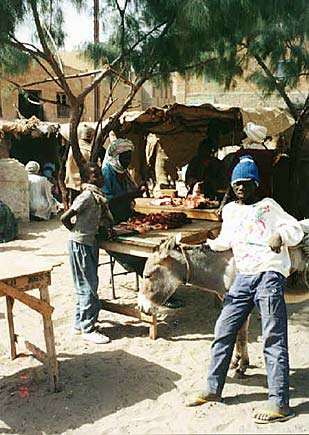 |
||
Timbuktu butcher shop; photo: Galen R.. Frysinger |
||
| Since that first plate of chicken in Niger, after seven years of being strict vegetarians, we had started to again eat a bit of meat once in a while. In Timbuktu we tried some very tasty roasted camel meat. | ||
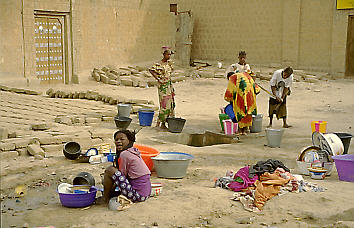 |
||
Timbuktu public well; photo: web |
||
| Worse happened to a friend. On a walk about town, he was gripped by a sudden onset of diarrhea. He knocked on the door of the nearest house, and, with a few gestures, explained his problem and asked if he might use the privy, usually consisting of a hole in the ground out back. Seeing in what a desperate situation the poor guy was, the house owner took advantage of the opportunity and made our friend pay an outrageous sum before he was allowed to relieve himself. | ||
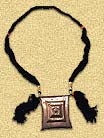 |
||
| One of the few available diversions was the local cinema, a small backyard affair were films were projected onto the whitewashed wall of an adjacent building. One movie shown was an old Indian black and white, featuring gods flying through the air on golden chariots and an unearthly pretty heroine. At every close up of that girl's beautiful face, heavy sighs of awe issued from the predominantly male spectators. | ||
| The second movie we saw was black and white as well, a French thriller. In one scene the protagonist was caught in a basement room filling up with some inflammable liquid. On realizing the danger he was in, our hero quickly extinguished his lighter and the screen accordingly went black. This caused a great ruckus among the audience, who, failing to follow the plot, believed the film to be damaged and started to shout angry insults. The spectators wer by far more entertaining to watch than the actual film. | ||
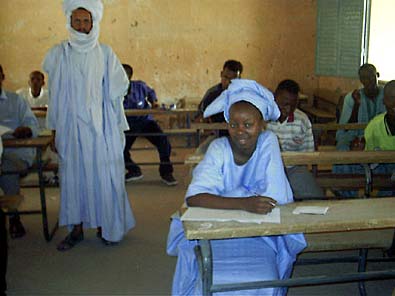 |
||
teacher with students, Timbuktu; photo:web |
||
| Often after sundown a visitor or two would drop in to share a cup of tea, a smoke, or just for a chat. One night thus a young lad from New Zealand, after having spent the evening at our place, set out to walk back to the campement around midnight. Halfway there, he felt a sting in his foot; which he took for a snake bite. Being rather stoned didn't help to curb his rising panic. | ||
| Fearing for his life, he made it to the campement as fast as he could manage. There, he asked to be driven to the hospital immediately. A car and a driver were available, but the sum asked for the short ride was so exorbitant that our panicky friend, fearing to drop dead any instant, had to haggle for near to a quarter of an hour until some agreement was reached. | ||
| Luckily, and to the boy's great relief, the alleged snake bite later turned out to be merely the sting of a scorpion. | ||
 |
||
traditional door; photo:web |
||
| After receiving all the letters we had been waiting for, we were only too happy to leave what, in our opinion, was one of the most boring and graceless places we'd ever come across. The three of us decided to return to Ghana, the same way we had previously come, as fast as we could. | ||
| Accra was still to have an unpleasant surprise in stock for us. One sultry afternoon Holli, along with a Scottish girl, her British husband and another Brit left for a swim at one of the city's main beaches. Never having been much of a beach rat, I didn't care to accompany them. | ||
| It was dark when the group returned to the hostel, minus Holli and in great agitation. The Scottish girl's hands were covered with bleeding cuts, and our friends had a horrifying story tell: Around dusk, when most other swimmers had left, the small group had gotten attacked by a gang of robbers, one of them sticking a knife into Holli's chest. | ||
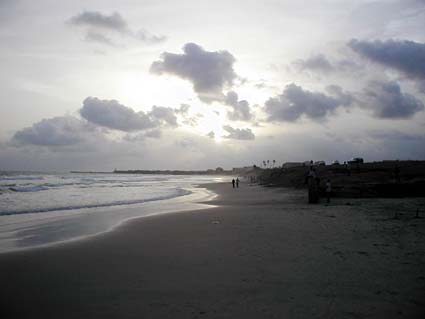 |
||
Accra beach at dusk; photo: web |
||
| Immediately taking a taxi to the hospital, we found our friend laying pale as a sheet in his bed, a bloodied bandage adorning his chest where the knife had pierced his lung. The doctors told us how lucky Holli had actually been: if the knife had entered the lung a mere few centimeters higher up, the wound might well have killed him. As it was, after two weeks at the hospital Holli was his old self again. Meanwhile the Scottish girl, despite having her cuts and a police report as proof of the mugging, only got a refund for her stolen American Express traveler checks after some resolute intervention on part of her father back home. | ||
| By the time Holli returned to the hostel, some money had arrived for us from the American friend we had sent the handicrafts to. Consequently, the three of us booked a flight that was to bring us to a place as different from West Africa as the day differs from the night: the "Mother of all Cities", magical, marvelous and hospitable Cairo. | ||
 |
||
back to main index |
||